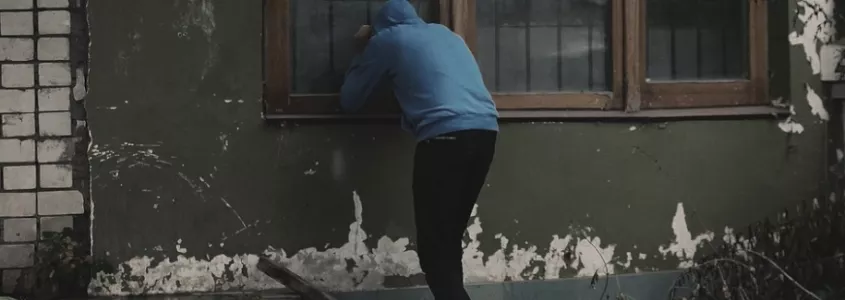
Table of contents
Breaking and entering is a crime that is the subject of countless American films. This makes it seem almost fictional to many people. However, it is contemplated in our Penal Code. We would like to dedicate this article to telling you everything you need to know about it.
What is breaking and entering?
The Criminal Code specifies that a subject commits the offence of breaking and entering when he or she enters the home or premises of a person who owns them without the latter's consent to do so. Likewise, it also covers the situation in which such a person remains inside these properties against the will of the owner or tenant.
In general, the offence of breaking and entering is often linked to other offences such as, for example, burglary or kidnapping. This means that in most cases it cannot be tried separately. It is very unusual for a person to enter an inhabited property without the consent of the owner without any other criminal purpose.
What is a dwelling place?
Due to the complexity and specificity of this offence, the Penal Code tries to define exactly the concept of dwelling. It does so in Articles 202 et seq. Specifically, it states that it is the space in which a physical subject resides or in which a legal entity has its domicile. In both cases, these activities are considered to fall within the scope of the private life of the person concerned.
This entails a particularity. If a home or premises are uninhabited, even temporarily and not permanently, there can be no offence of breaking and entering. However, the existence of coercion is contemplated.
An illustrative example of this problem
Let us give you an example. Imagine that next summer you go camping with your family and friends. One afternoon you go for a dip in the pool and, when you return, you find that someone has broken into your tent and stolen your belongings.
The tent is a property in which, even if only for those few days, he is conducting his private life and is therefore liable to be broken into. A person who does so would be punished under this offence.
However, if you have your tent in the boot of your car and someone inadvertently steals it from you, you are not. This is because, at that moment, it cannot be said to be a place where your private life or that of your loved ones takes place.
This offence is based on the important constitutional principle of the inviolability of the home. This states that no search or entry may be carried out without the express consent of the owner or, failing that, a court order permitting it, unless a flagrant crime is being committed inside the home.
It should be noted, with reference to Article 204 of the Penal Code, that conduct of this type carried out by a public official is also punishable, albeit in a special and even harsher manner.
So what are the express requirements for breaking and entering?
As we have already mentioned, the mere entry into another person's home or premises without their express consent does not necessarily imply the commission of the offence of breaking and entering.
In the first place, the property must be understood as a dwelling according to the precepts determined by the Criminal Code, which we have also discussed above. In any case, it must be a space destined for the development of any sphere of private life, regardless of whether it is accredited, at the time of the entry of the foreign subject, by a deed to the property or by a rental contract.
For example, based on the jurisprudence of the Supreme Court in its rulings, a car has been ruled out as a property that can be the object of a home invasion. On the other hand, a van, a tent, a cave, a garden, a hotel room or a caravan are. This is because, even if not on a regular basis, they are spaces in which the private life of their owners and users takes place in one way or another.
The offence of breaking and entering can be committed actively or passively, regardless of the means used to access the property. In fact, it is contemplated in the same way in the event of having forced the lock on the door to gain access or of remaining in the dwelling or premises when the owner or tenant has manifested his or her manifest will to leave.
Penalties under the Criminal Code for the offence of housebreaking and entering
The penalties for the offence of breaking and entering are set out in Articles 202 and 203 of the Penal Code. Specifically, they are as follows:
1. Imprisonment of between 6 months and 2 years for those who enter another person's dwelling without residing therein and without the express authorisation of the inhabitant. In the event that the access is carried out with intimidation or violence, the penalty shall be between 1 and 4 years' imprisonment accompanied by a fine of between 6 and 12 months' imprisonment.
2. Imprisonment of between 6 months and 1 year and a fine of between 6 and 10 months for those who enter the home of a private or public legal person, premises open to the public outside their opening hours, a commercial establishment or an office or professional office against the owner's will.
3. A fine of between 1 and 3 months for those who remain inside the home of any of the legal entities mentioned in the previous section against the will of the owner or tenant. If it is carried out by means of force and/or intimidation, a prison sentence of between 6 months and 3 years is added.
In short, the offence of breaking and entering contains an infinite number of specificities that determine it. This is why it is often confused with other crimes. However, we believe that this article may have helped you to better understand the factors that intrinsically characterise it.

"Anywhere in Spain"
With our online appointment system you will have immediate advice without the need for face-to-face visits or travel.
One of our lawyers specialized in your area of interest will contact you to formalize an appointment and make your consultation by video call.

Add new comment